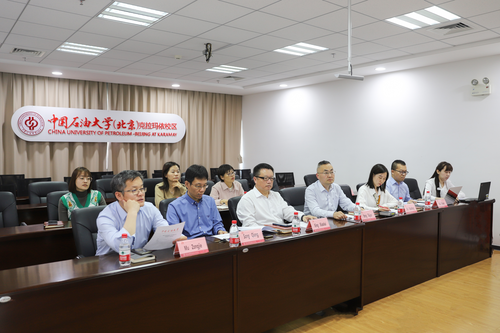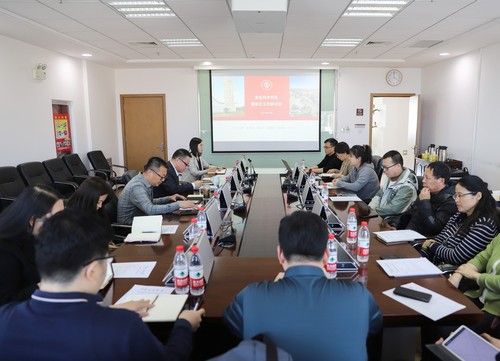
NEWS
On the afternoon of March 15, the campus held an online exchange meeting with Skolkovo Institute of Science and Technology (SKOLTECH) in Russia. Mihail Spasennykh, the director of the Petroleum Science and Engineering Center at Skolkovo Institute of Science and Technology, and representatives of professors from the center participated in the meeting. Xing Xiaokai, vice president of the campus, attended the meeting, along with responsible persons from the Organization and Personnel Department, Graduate Department, Science, Technology, and Information Department, and Cooperation and Development Department, as well as teachers from relevant colleges.

During the meeting, both sides introduced the basic information of their respective institutions and conducted in-depth discussions and exchanges on topics such as teacher exchanges, joint training of graduate students, and joint application for scientific research projects. Mihail Spasennykh expressed that the two universities have many similarities in terms of advantageous disciplines and talent cultivation, and there is broad cooperation space and development prospects. He looked forward to expanding the scope and areas of cooperation through exchanges and cooperation between the two sides to achieve mutual benefit and win-win results. Xing Xiaokai pointed out that this cooperation and exchange with Skolkovo Institute of Science and Technology is expected to further enhance and expand educational cooperation between the two institutions and the two countries, promote the sharing and interconnection of international resources, actively explore new paths for cultivating high-level, applied, and international talents in the campus, and contribute educational strength to implementing the national "Belt and Road" cooperation initiative and serving the construction of the core area of the Silk Road Economic Belt in Xinjiang. Both sides reached a consensus that the campus can hire teachers from Skolkovo Institute of Science and Technology in Russia to teach short-term courses; can pilot the joint training of graduate students in relevant majors such as petroleum engineering; and can jointly apply for international natural science foundation cooperation projects to jointly produce outstanding talents and scientific and technological achievements.

Previously, in order to deeply implement the spirit of President Xi Jinping's reply to Central Asian international students at China University of Petroleum (Beijing) and promote the internationalization work of the campus, an internationalization work symposium was held on March 5. Li Jun, president of the campus, and Xing Xiaokai, vice president, attended the meeting. Responsible persons and teacher representatives from the Teaching Affairs Department, Science, Technology, and Information Department, Cooperation and Development Department, and various colleges participated in the meeting. The participants fully discussed matters related to the implementation of cooperation agreements with Skolkovo Institute of Science and Technology in Russia, Satpayev University in Kazakhstan, and other universities, promoting the recruitment and training of international students coming to the campus in 2024, promoting international scientific research cooperation, and piloting the joint training of international students.
Skolkovo Institute of Science and Technology (SKOLTECH), located in Moscow, the capital of Russia, is part of the Skolkovo Innovation Center, known as the "Russian Silicon Valley". It was jointly established by the Massachusetts Institute of Technology (MIT) and the Skolkovo Foundation in 2011. The university offers fully English-taught programs in petroleum engineering, energy systems, computer science, mathematics and physics, photonics and quantum science, Internet of Things and wireless technology, space engineering systems, life sciences, and materials science.